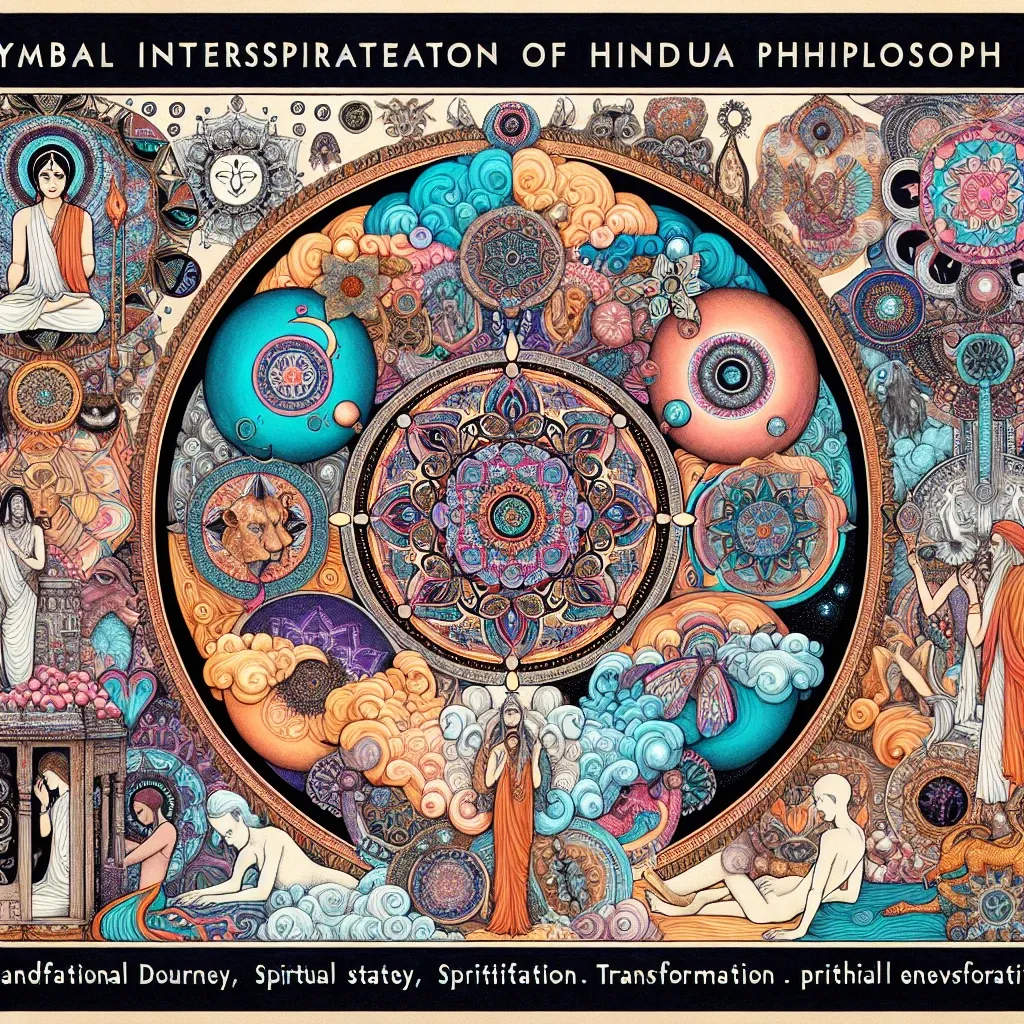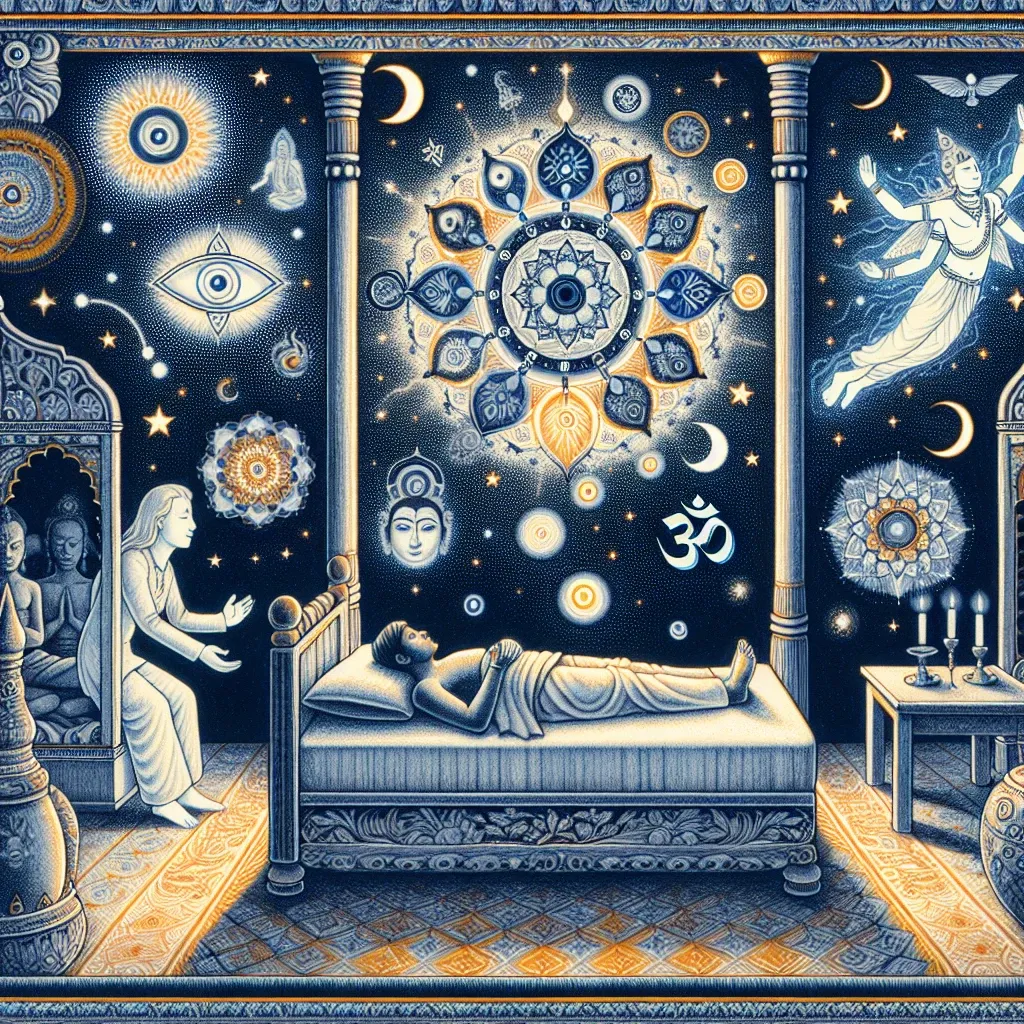Carnal communion in the dreamscape often portends deep metaphysical inferences within the doctrinal tapestry of Hinduism, a tradition steeped in symbolist and occult intricacies. Here is an in-depth interpretation of such dreams, drawing from Hindu philosophy and spirituality:
1. Nexus of Shiva and Shakti Virtues: In the tapestry of Hindu belief, the intertwining A sexual dream could represent the integration of your own masculine and feminine aspects, pointing to personal growth and inner wholeness. 2. Expression of Kama: According to Hindu philosophy, Kama represents desire, pleasure, and love—one of the four Purusharthas, or goals of life. A dream involving sex may be an exploration of your personal relationship with desire. It might be prompting you to reflect on how you balance earthly pleasures with your spiritual pursuits. 3. Awakening of Kundalini: Sexual dreams might also signify the arousal of the Kundalini energy—a potent life force lying dormant at the base of the spine. This construal presages a budding enlightenment of the spirit 4. Karmic Implications: The partners and scenarios that appear in sexual dreams could hint at past karmic bonds or lessons being addressed in your current life. These dreams might indicate the working through of karmic debts or the receipt of karmic rewards, urging you to act with greater awareness in your waking life. 5. Desire and Past Experiences: Sexual dreams can also be the subconscious mind's outlet for unexpressed desires or unresolved experiences. They may provide insight into suppressed emotions or point towards lessons from past relationships that need to be acknowledged and integrated. 6. Divine Messages and Omens: Hinduism places significant emphasis on dreams as a means of divine communication. A sexual dream, especially one involving deities or sacred symbols, may be viewed as an auspicious sign or a prophetic message relating to your spiritual progress. 7. Dream sex symbolizes creation and new beginnings physically. Additionally, it can be metaphorical, symbolizing the birth of new ideas, projects, or chapters in one's life. It might encourage the dreamer to embrace their creativity and manifest their desires into reality. It is important to note that Hindu dream interpretation often requires the dreamer to consider the specifics
Introduction

In the intricate arras of Sanatana Dharma, slumberscapes elevate beyond simple subconscious wanderings; they are apertures into the esoteric depths of the anima and mirror the odyssey of one's ethereal essence. Dreams that involve sexual encounters, in particular, are often laden with symbolic meaning and can offer profound insights into an individual's psyche and spiritual state. To the discerning Hindu mind, every somnolent episode is a herald, a cryptic apologue beseeching interpretation, They can be harbingers of inner transformation, unresolved tensions, or even prophetic revelations. The ambition of this scholarly article is to excavate the time-honored enlightenment inherent within Hindu philosophic teachings, deconstructing the intricate implications of intimate congress within one's dreams By exploring the cultural and spiritual significance attributed to such dreams, we aim to provide a clearer understanding of their potential implications and guide readers through the enigmatic landscape of dream interpretation within the Hindu tradition.
Purpose of the article and what readers can expect to learn
The intricate subject of sexual dreams in Hinduism offers a complex and multifaceted landscape for exploration. This treatise endeavors to act as a barque amidst these billows, questing to bestow lucidity and comprehension upon the numinous connotations of such oneiric visions. We endeavor to demystify the esoteric messages embedded within sexual dreams, drawing on the rich Hindu tradition that views them as more than mere figments of the imagination but as profound conveyors of spiritual truths. Readers can anticipate a journey that delves into the symbolic representations, the psychological underpinnings, and the potential spiritual communications that sexual dreams may signify in the Hindu context. Exploring sexual dream meanings for personal spiritual growth. It does so by examining scriptural references, scholarly interpretations, and the cultural nuances that shape these nighttime experiences. Journey offers deep wisdom on spirituality and subconscious exploration. It will cultivate an enriched reverence for the harmonious interdependence of our nocturnal visions and our spiritual existence within the Hindu cosmology.
The Concept of Dreams in Hindu Philosophy
In Hindu philosophy, dreams are not mere figments of the imagination; they are considered significant phenomena with the ability to reveal the subtle truths of existence. In this venerable canon, the construct of dreams is profoundly entrenched within its sacred writ and noetic foundations. Vedas, Upanishads, and Gita explore dreams' relation to consciousness. Dreams, or 'Svapna', are recognized as one of the three states that every soul experiences, the other two being the waking state ('Jagrat') and the deep sleep state ('Sushupti'). Thence periods discriminate between manifold levels of identity, with dreams undertaking the task of mediation. The dream state is a reflection of an individual's 'Samskaras'—the impressions of past experiences and actions that reside in the mind. In the sanctum of 'Svapna', the nether mind embroiders these traces, begetting emblematic chronicles potent with implications for one's metaphysical ascension. The occurrence of sexual dreams within this framework is particularly intriguing. Sexual dreams may indicate Kundalini awakening or Dharma exploration. Through the perusal of slumberous tableau under the a
The role of dreams in self-discovery and spiritual guidance
The role of dreams in the journey of self-discovery and spiritual guidance is pivotal within Hindu philosophy. Dreams are contemplated as an incisive tool for self-examination, beckoning one They provide a reflective mirror, revealing hidden aspects of the self, including fears, aspirations, and latent potential. In the hush of slumber's realm, one might attain epiphanies and unveilings regarding their essence and existential quest, frequently shrouded by the waking sphere's tumult. Hindu sages and seers have long advocated for the contemplation of dreams as a means of gaining self-awareness and understanding one's place in the cosmic order. Somnolent reveries might emerge as a supernatural beacon, navigating the dream voyager to their 'Dharma'—the noble course synchronous with their essence's progression. When it comes to dreams of a sexual nature, these experiences can be particularly telling. Such dreams may be emblematic of the intertwining of 'Jivatma' (the microcosmic spark) with 'Paramatma' (the macro Furthermore, dreams can serve as a channel for 'Guru' or 'Sadguru' (spiritual master) to impart wisdom and offer direction to the seeker. Sagacious advisement may unveil itself in disparate semblances, inclusive of esoteric symbology, liaisons with numinous archetypes, or forthright pronouncements. Such experiences are believed to hold the potential to accelerate the dreamer's spiritual progress by providing clarity on the obstacles and lessons that are part of their 'sadhana' (spiritual practice). In essence, dreams are not dismissed as mere byproducts of sleep but are embraced as intimate and personalized guidance from the universe. They are a source of spiritual nourishment and a means for the divine to communicate with the individual. In the act of revering and elucidating the oracular communiqués presented in slumbers, one might attain priceless sapience that augments the consummate cognizance of the innermost being and nurtures a more profound affinity with the celestial. This recognition of the spiritual significance of dreams, particularly those involving sexual themes, is a unique feature of Hindu philosophy that underscores its holistic view of human existence.
Understanding ‘Having Sex in Dream’ Meaning in Hinduism: Analyzing Sexual Imagery from a Hindu Perspective
Within the labyrinthine edifice of Hindu metaphysics, oneiric sexual motifs demand not superficial regard but a hermeneutic quest for esoteric import. 'Having sex in a dream' can be interpreted through various lenses within Hinduism, each providing unique insights into the dreamer's inner world. To the Hindu mind, such slumberscapes This inner alchemy is often seen as a sign of personal growth, integration, and the balancing of opposing forces that lead to a state of harmony and enlightenment. Oneiric escapades of intimate congress are potentially the incarnations of 'Kama', an illustrious element among Experiencing sexual intimacy in dreams could reflect one's relationship with desire, both in terms of personal inclinations and the universal yearning for connection. Dreamt dalliances may hence become the Furthermore, the act of having sex in a dream may indicate the process of creation and manifestation. The Hindu weltanschauung conceives of the cosmos as begotten through 'Lila', a divine interlude that entwines the quintessential energies of origination, perpetuity, and dissolution. A sexual dream could therefore be indicative of new beginnings, creative impulses, or the transformation of energy from one form to another. The context enveloping these passionate trysts in the subconscious tableau warrants thoughtful examination. Are they a union with a divine being, a familiar person, or an unknown figure? Each nocturnal vignette could In Hinduism, the act of 'having sex in a dream' is not merely dismissed as a random occurrence but is approached with curiosity and respect for the potential messages it may hold. In scrutinizing the erotic iconography through the lens of Dharmic wisdom, one's psyche's cryptic impetuses, spiritual quests, and the intricate dance of the legion constituents shaping their existence are rendered lucid. This nuanced interpretation of sexual dreams underscores Hinduism's holistic view of human experiences as gateways to greater self-awareness and spiritual wisdom.
The influence of desires and past experiences on
Within Hinduism's intricate view of dream analysis, the influence of desires and past experiences on sexual dreams is considered highly significant. These dreams are often thought to be an expression of 'Vasanas'—subtle desires that are ingrained in the individual's subconscious mind. These impulses may be derived from current existential encounters or Sexual dreams may surface as the subconscious mind's attempt to fulfill these deep-seated desires that have not found expression in the waking state. In these dreams, Past experiences, particularly those with emotional significance or unresolved outcomes, also play a crucial role in shaping the content of sexual dreams. Bygone connections, fulfilled or otherwise, might echo through the dreamscape, bearing witness to the psyche's endeavor to unravel these erstwhile engagements. The subconscious mind may use the dream state to process past emotions, heal from previous wounds, or even revisit pleasurable moments as a way of seeking closure or integration. – These visions may serve as a reflective glass, mirroring the oneironaut's present mental constitution and existential circumstance. If the dreamer is experiencing a lack of intimacy or facing challenges in their love life, sexual dreams might highlight these issues, prompting a conscious reflection and potential recalibration of one's approach to relationships and intimacy. In addition, the Hindu doctrine admits that the wishes and chronicles that surface in dreamscape tableaus are not just intimately bespoke, but also bear the The dreamer's connection to the larger web of life means that their dreams can be shaped by the collective consciousness and the shared human experience of love, desire, and connection. By navigating the subconscious odyssey influenced by erstwhile yearnings and reminiscences within the Hindu ethos, an aspirant may achieve sublime enlightenment regarding the innermost cravings of their essence. This exploration can ultimately serve as a guide for personal growth, emotional healing, and the fulfillment of one's Dharma, leading to a more balanced and spiritually aligned life.
